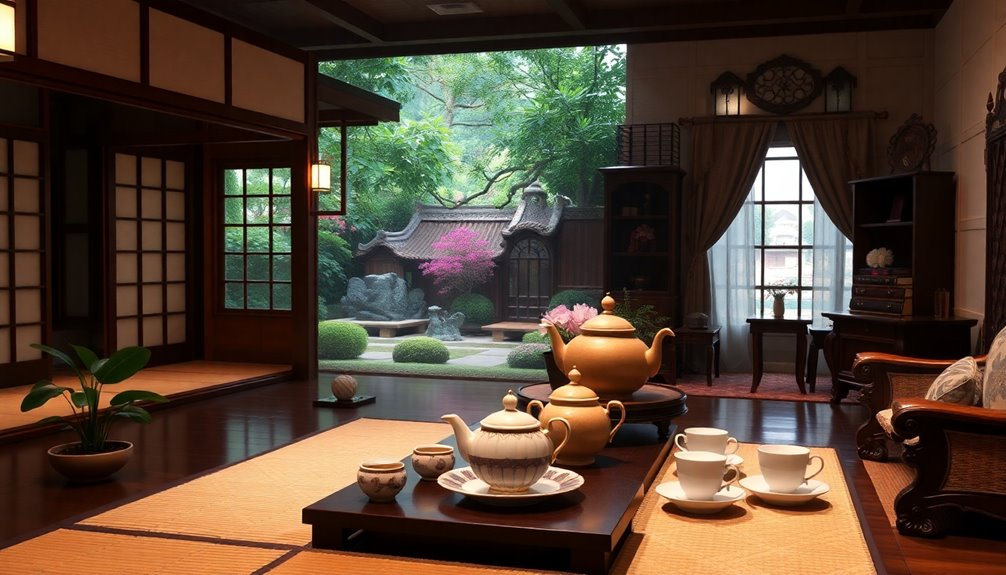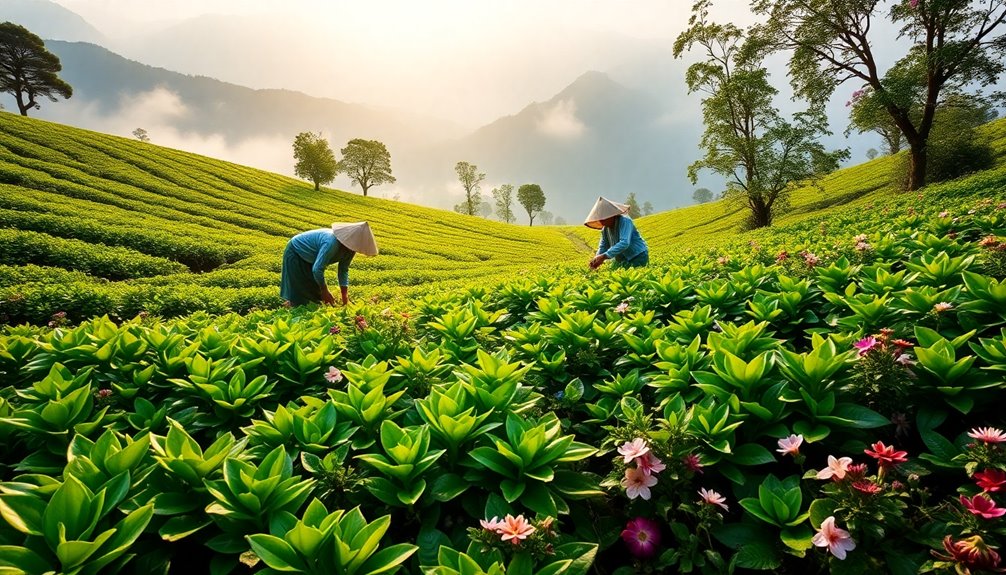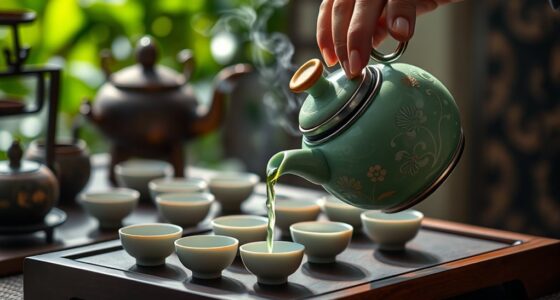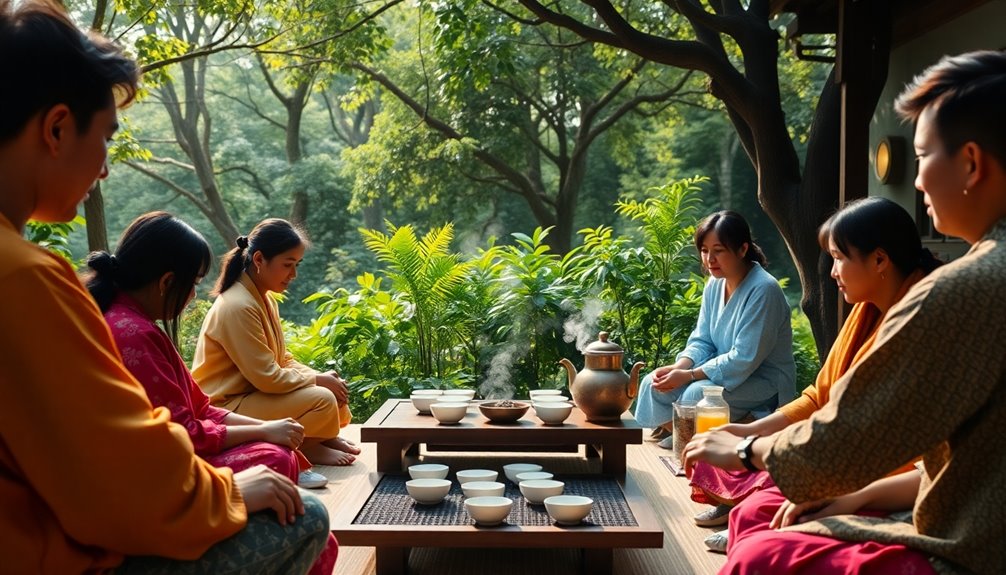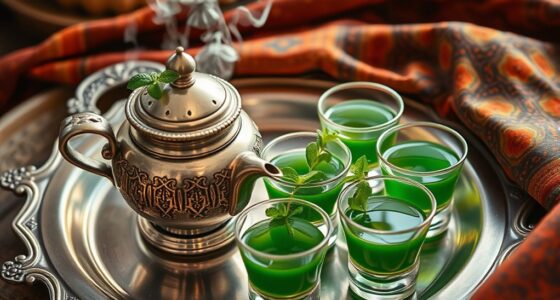Tea ceremonies have evolved greatly from their humble beginnings in 9th century Japan. Initially a meditative practice by Zen monks, these ceremonies became social events for the elite by the 16th century. A key figure, Sen no Rikyū, refined the ceremony, emphasizing grace and mindfulness. Matcha tea became central, promoting calmness and reflection. Samurai culture also embraced tea as a sign of refinement and camaraderie. Today, the tea market thrives with specialty shops offering unique experiences. Each sip connects you to history and culture. If you want to uncover more fascinating details, there's much still to explore!
Key Takeaways
- Tea ceremonies originated in 9th century Japan, evolving from meditative practices to social gatherings among the elite by the 16th century.
- Zen Buddhism introduced mindfulness and meditation, making tea drinking a vital aspect of Zen rituals and enhancing participants' focus.
- Sen no Rikyū refined tea ceremonies, emphasizing rustic beauty and mindfulness, which became foundational in Japanese tea culture.
- Samurai culture embraced tea ceremonies as symbols of refinement, aligning Zen principles with the bushido code of loyalty and respect.
- Modern commercialization has led to a global tea market, fostering a resurgence of traditional practices and diverse tea experiences.
Introduction
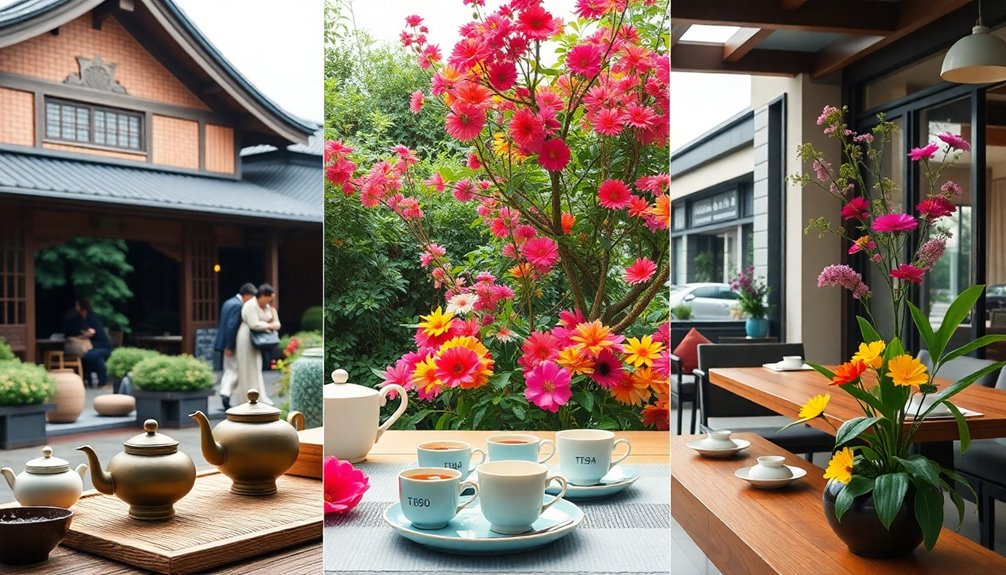
Tea ceremonies have a rich history that spans centuries, with roots deeply embedded in various cultures. One of the most famous is the traditional Japanese Tea Ceremony, known as chanoyu. It all began in the 9th century when a Buddhist monk named Eichu served tea to Emperor Saga, marking the start of a beautiful cultural practice.
Over time, these ceremonies evolved from quiet, meditative experiences practiced by Zen monks to elaborate social gatherings enjoyed by Japan's elite during the 16th century.
The cultural significance of the tea ceremony is immense, as it reflects not only social connections but also deep spiritual engagement. When you participate in a ceremony, you'll notice how the preparation of powdered green tea is done with great care.
The aesthetics focus on wabi-sabi, which finds beauty in simplicity and imperfection. This means every element, from the tea utensils to the surroundings, is chosen thoughtfully to create harmony.
Key figures like Sen no Rikyū helped refine these ceremonies, emphasizing rustic beauty and mindfulness.
Today, the traditional Japanese Tea Ceremony continues to adapt, drawing interest worldwide through workshops and cultural exchanges, keeping this rich tradition alive for everyone to enjoy.
Zen Buddhist Influence
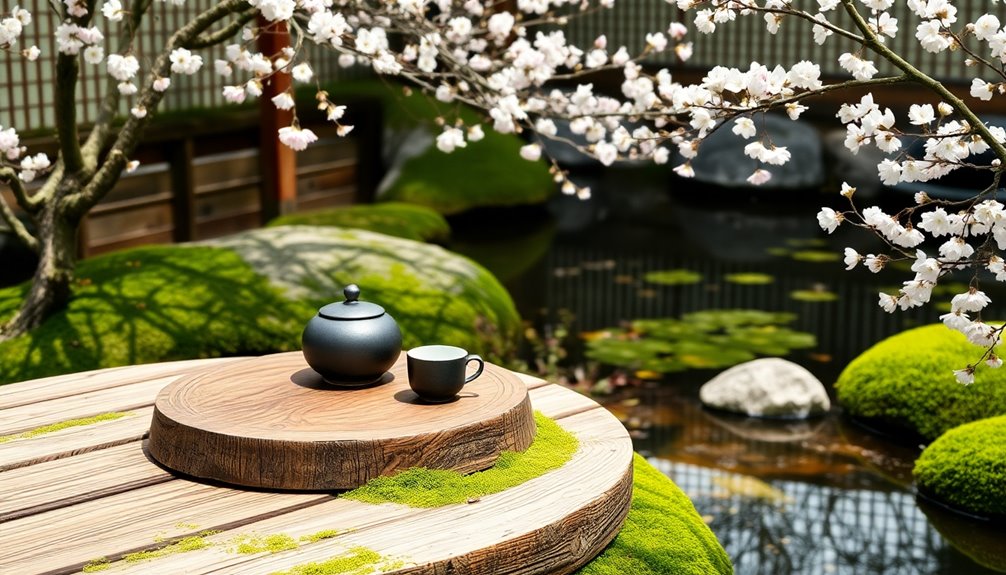
The influence of Zen Buddhism on the Japanese tea ceremony profoundly shapes its practice and meaning. This ceremony holds deep spiritual significance, emphasizing mindfulness and meditation. Introduced by Zen monks in the 9th century, tea drinking evolved from a medicinal experience to a vital part of Zen rituals.
The tea master, or chajin, plays a key role in this practice, trained in the principles of Zen Buddhism. Their expertise ensures that tea preparation is filled with intentionality, enhancing the experience for everyone involved. As you engage in serving tea, you'll notice how Green Teas, particularly matcha, are celebrated for their ability to promote focus and calmness.
Additionally, the aesthetics of the tea ceremony reflect Japanese culture, showcasing simplicity and imperfection. These concepts, known as wabi-sabi, highlight the beauty in natural forms and fleeting moments.
Each sip of traditional tea invites you to connect with the present, allowing space for reflection and gratitude. Through this beautiful ritual, you not only enjoy tea but also embrace the serenity that Zen teachings offer, making every gathering a moment of peace and connection.
Cultural Significance of Matcha
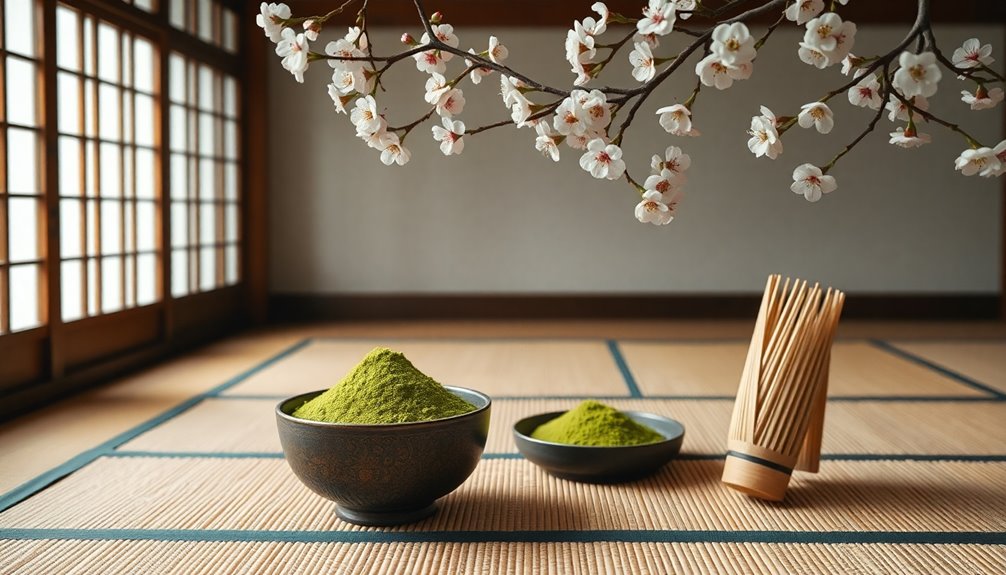
So, whether you're enjoying a traditional tea ceremony or a trendy matcha latte, you're partaking in a practice that celebrates both history and the beauty of the present moment.
Enjoy the experience and the unique flavor of matcha!
Influence of Samurai Culture
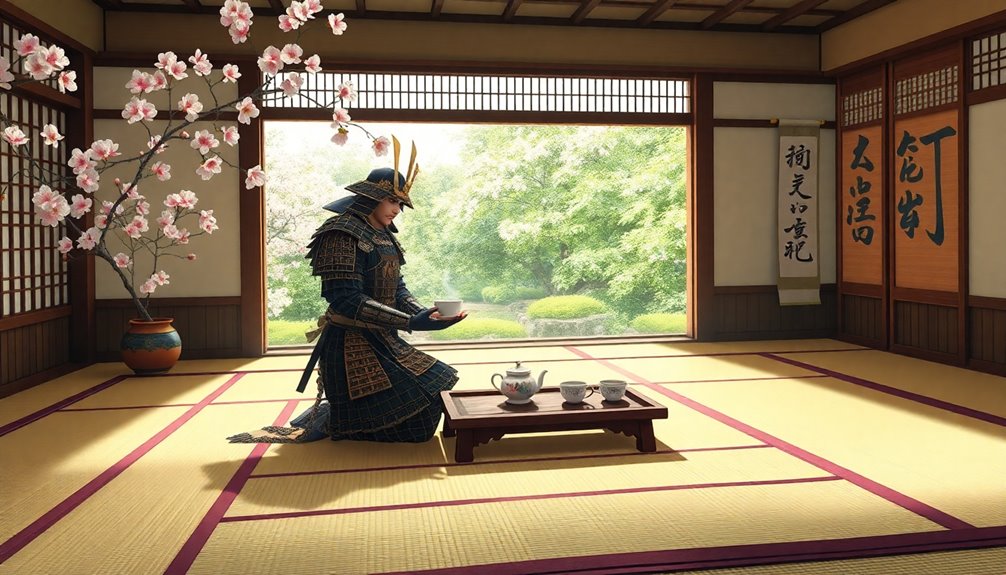
Rooted in a rich history, samurai culture played a pivotal role in shaping the tea ceremony as we know it today. During the Muromachi period, samurai embraced tea ceremonies, or chanoyu, as symbols of refinement and discipline. They adopted Zen principles that highlighted mindfulness, simplicity, and a deep connection to nature—values that aligned perfectly with their bushido code.
Tea gatherings became important social events among samurai. These occasions weren't just about sipping matcha; they were opportunities to demonstrate loyalty, respect, and camaraderie among warriors. As samurai interacted, they reinforced social hierarchies and relationships, making each ceremony a meaningful experience.
Additionally, samurai valued aesthetics in chanoyu, often incorporating friendly competitions to showcase their skills. They engaged in tea contests, highlighting their abilities in preparing and appreciating high-quality matcha. Influential figures like Sen no Rikyū shaped the etiquette and rituals that still guide tea practices.
In this way, samurai culture not only enriched tea ceremonies but also ensured that each gathering was filled with beauty, respect, and a sense of discipline, making the tradition even more special for everyone involved.
Modern Commercialization of Tea

As samurai culture elevated the tea ceremony to an art form, today's landscape reveals a stark contrast with the modern commercialization of tea.
In recent years, the global tea market has exploded, expected to reach around $73 billion by 2024. This growth shows how much you and others value convenience and variety in tea. The popularity of organic tea products is also contributing to this market expansion, as consumers seek healthier options. Additionally, many tea enthusiasts are rediscovering the significance of traditional tea ceremony practices, which emphasize mindfulness and respect. Herbal teas, known for their health benefits, are becoming increasingly popular among consumers looking for natural remedies, especially with the rise of herbal blends that align with health-conscious trends.
Specialty tea shops and cafes now offer curated tea experiences, featuring a diverse range of premium and artisanal tea products. You can find everything from classic brews to trendy options like matcha!
Thanks to social media, tea culture has become even more vibrant, with influencers showcasing beautiful tea preparations that capture your attention and inspire your choices.
Online platforms and subscription services make it easy for you to explore teas from around the world, connecting you to different traditions and flavors.
Plus, with the rise of wellness trends, health-conscious consumption is on the rise. Many are turning to herbal blends and matcha, seeking both enjoyment and functional benefits. Caffeine content in tea can vary significantly, influencing consumer choices towards healthier options.
This evolution highlights how tea has transformed from a ritual into a modern lifestyle choice, bringing excitement to your daily routine!
Practical Applications
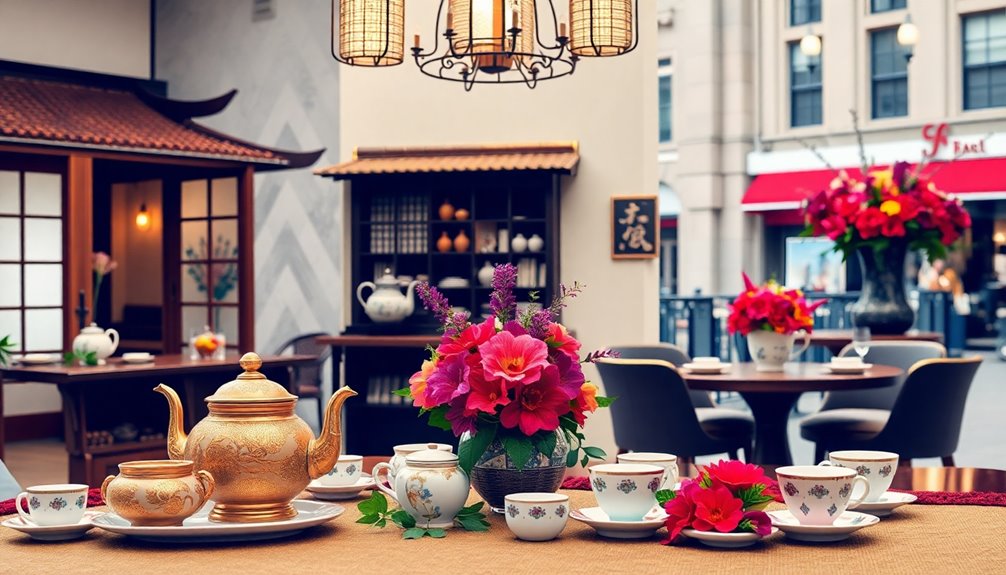
Engaging in the Japanese tea ceremony, or chanoyu, offers practical applications that extend beyond mere tradition. First, you can join workshops and classes designed for all skill levels, where you'll learn the art of preparing tea. These sessions not only teach tea preparation but also emphasize the importance of harmony, respect, and tranquility.
Modern adaptations of the tea ceremony incorporate mindfulness, allowing participants to pause and reflect in our fast-paced lives. By focusing on the simple act of making tea, you can cultivate a sense of calm and presence.
Community engagement has grown through social media, as enthusiasts share their experiences, techniques, and insights. This connection fosters a global appreciation of the tea ceremony, creating a cultural bridge between different practices and traditions.
As you participate in these tea gatherings, you'll discover that the tea ceremony isn't just about serving tea; it's an opportunity to build relationships and share moments of joy with others.
Whether you're a beginner or an expert, the practical applications of the tea ceremony can enrich your life and broaden your understanding of this beautiful cultural practice.
Frequently Asked Questions
How Has the Tea Ceremony Changed Over the Years?
The tea ceremony's changed significantly over the years. You'll notice its shift from a meditative practice to a stylized art form, incorporating modern elements that enhance accessibility and encourage social connection in today's fast-paced world.
How Old Are Tea Ceremonies?
Tea ceremonies date back to the 9th century CE, making them over 1,100 years old. You'll find that their rich history reflects cultural shifts and evolving practices throughout Japan, maintaining relevance even today.
What Are the Origins of the Japanese Tea Ceremony?
You'll find the Japanese tea ceremony originated in the 9th century when a Buddhist monk introduced tea to Emperor Saga. It evolved over centuries, gaining significance through Zen influences and the artistry of matcha preparation.
What Is the Cultural Significance of the Tea Ceremony?
The tea ceremony's cultural significance lies in fostering harmony, respect, purity, and tranquility. It allows you to connect with others, appreciate art, and embrace mindfulness, reflecting deep-rooted values that enhance your understanding of Japanese heritage.
Conclusion
In conclusion, tea ceremonies have changed a lot over the years, blending traditions from Zen Buddhism, samurai culture, and modern life. You've learned how matcha holds special meaning and how tea has become popular around the world. Today, whether you enjoy a simple cup or join a festive gathering, tea brings people together. So, why not explore different types of tea and try hosting your own little ceremony? You might just discover something wonderful!

